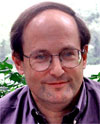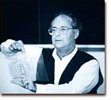Reposted from: http://edge.org/q2007/q07_16.html
my highlights in blue
GEORGE F. SMOOT
Cosmologist, Lawrence Berkeley National Laboratory; Recipient, The Nobel Prize For Physics 2006; Coauthor, Wrinkles in Time

Correggio Domani e for peggio! — Courage for Tomorrow Will Be Worse! (The Words of a Born Optimist)
A careful assessment and years of experience that show that the long-term future is most bleak: Entropy will continue to increase, and a heat death (actually a misnomer as it means the degredation of usable energy in a dull cooling worthless background of chaos) is the very likely fate of the world. This is the fate that awaits us, if we manage to work our way past the energy crisis that looms as the Sun runs out of fuel and in its death throws expands as red giant star likely to engulf us after boiling away the seas before it collapses back to a slowly cooling cinder eventually to leave the solar system in cold darkness.
This energy crisis will eventually spread to the whole Milky Way Galaxy which will use up its available energy resources in a time scale of roughly ten times the present 14 billion year lifetime of our observed Universe. In that same time the accelerating expansion of the Universe continually reduces what we can observe and potentially access until in the distant future only the cinders of stars in our own galaxy are left. Argument goes on whether a sufficiently advanced intelligent society could manage to live (continue to have experiences and process new information and create new things) indefinitely in such an environment taking on the most carefully constructed and extreme measures that are physically possible. The chances of success look relatively low for even the most optimally managed and intelligent society.
Given this and the history of human society in cooperatively plundering the resources of a meager but beautiful planet with currently abundant resources, who can possibly be optimistic about the long-term future of humanity? How many examples do we have of humans addressing global problems in an efficient way and with enlightened self-interest? Historical experience is that humans have generally been engaged in warfare, exploitation for personal gain and religious strife. Real issues are generally not addressed until they become serious crises and often not even then. We could mention here, various episodes of genocide, large-scale pollution, and ecological devastation, which are often interrelated.
In this background the rise of culture and science is remarkable. That is until we understand their usefulness. In our modern world it is clear that material rewards and political power accrue to those that have the most scientific and technological knowledge and the educated workforce with the cultural background of hard productive work as part of a larger system. Such societies have economic and military success and large tax revenues.
Is it this culture and knowledge that offers us hope to be at least as successful as the dinosaurs which dominated the Earth for nearly 100 times as long as humans have held sway? It is often said that the United States systematically underestimates the stubbornness preventing the peaceful resolution of long-term ethnic and tribal conflicts — perhaps because of being the melting pot of waves of peaceful immigration — less a few Indian wars. However, could humans share the planet with reptiles? Or how about intelligent machines? Could they share with us?
Now leaving cultural and religious value systems aside, let us move to realistic assessment of the title "Courage for Tomorrow will be Worse". Every physical process in the Universe follows the second law of thermodynamics. That is in every process entropy (a measure of disorder which equals loss of information and usefulness) will tend to increase for the Universe as a whole. No process decreases the entropy of the Universe. Only completely reversible processes leave it unchanged. All living things and all man-made machines operate with processes that increase the entropy of the Universe.
One cannot live by the Hippocratic dictum "Do no harm". But the best one can hope for is the weak mantra "Do minimal damage". I was often bothered by this inevitable conclusion and tried to see that if one could write a great work of literature, make art, or most optimally a great science discovery could one objectively leave the world better than one found it? Each time I worked out an example, the impact was negligible however great it was found by human culture compared to the damage done by mere existence. The only discovery that would make a difference called for repealing or avoiding the laws of probability or making a whole new universe. Both of these are quite extreme. Perhaps the discovery of extra dimensions would allow some leeway in what otherwise seems an inescapable doom after a long period of unrighteous degradation of the universe. We face a continuous downward spiral of no return. This is not a moral or ethical statement only an engineering evaluation though it is some indication of original sin. So even living one's life as a vegetarian that only eats fruit dropped into one's hand by a willing plant is only going so far as to be very kind and considerate to other beings that are also worsening the universe for the sake of a little more order in their own self.
With such sure knowledge of one's own impending demise as well as for all humanity, how can one get up and face each day with any hope? Well in science it is a central tenet to be skeptical and to question and as certain as this seems, one could cling to a shred of hope that there is some trap door of escape that will be found and opened either because of the greatness and infinite flexibility of mankind or our incredible ingenuity under extreme pressure. I suspect that the odds of winning the lottery are higher — much higher.
"perchè sai che domani sarà impossibile anche alla tua astuzia." (poet Eugenio Montale)
"because you know that tomorrow it will be impossible no matter how astute you are." (translation by Jody Fitzhardinge & Lorenzo Matteoli)
Instead one might look to the definition of courage and optimism and go forth cheerfully and eagerly even when there isn't the smallest sliver of hope and still do great and glorious deeds, build great civilizations even in the face of their inevitable doom.
It takes real optimism and courage to go forth when the inevitable course for the universe is downhill and knowing that all humanity has done or is likely to do will probably have less impact than a footprint on sand after a few dozen or thousand waves pass over it.
I am from the very beginning an optimist and remain so right to the very end.
I invest time and effort into my work, my health and fund my retirement plan fully.
I even write articles and spend much of my days training and educating the next generation. Why do I do this? Because I think that the future, on my human and longer time scale, can be very bright as long as humans work well and intelligently.
I look forward to the immediate future as a part of the long human slog towards a better culture and society in spite of the constant flux of misguided craziness.





















